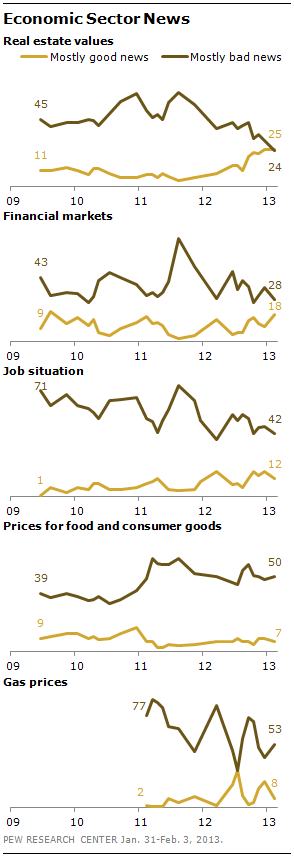Overview
As Barack Obama begins his second term in office, the public is hearing a mix of good and bad news about the economy, as it has for much of the past four years. Views of news about real estate values and financial markets have improved and are as positive as they have been in the last four years. But these relative bright spots are counterbalanced by persistently negative views of news about gas prices and prices for food and consumer goods.

For the first time, as many say they are hearing mostly good news (25%) as bad news (24%) about real estate values; the remainder (40%) says the news is mixed. In 2009, far more saw the news about real estate as bad than good and the balance worsened considerably in 2010 and 2011. The latest survey by the Pew Research Center, conducted Jan. 31-Feb. 3 among 1,000 adults, finds that perceptions of news about financial markets have become more positive since the end of last year. Nonetheless, more say the news about the financial markets is mostly bad (28%) than mostly good (18%); 44% say the news is a mix of good and bad. The job situation also is viewed less negatively: 42% say the news about jobs is mostly bad, the lowest percentage in nearly a year and far lower than the 71% who viewed job news negatively in June 2009.
By contrast, views of news about prices for food and consumer goods remain broadly negative and have shown no improvement over Obama’s first term. Half (50%) say they are hearing mostly bad news about consumer prices; just 7% say they are hearing mostly good news. In June 2009, shortly after Obama took office, impressions of news about prices were less negative (39% mostly bad news vs. 9% mostly good news).
By a 53%-8% margin more say they are hearing mostly bad news about gas prices than mostly good news. The percentage hearing mostly bad news about gas prices has jumped 11 points since December and 22 points since July.
There have been wide swings in perceptions of news about gas prices – and other economic sectors – over the past four years. For instance, over a four-month period last year, between March and July, the percentage viewing news about gas prices as mostly bad fell 54 points, from 85% to 31%.
Opinions about job news improved both last spring and the year before, but subsequently declined. In March 2012, for instance, 38% said job news was mostly bad. In June, that figure rose to 55%, before declining in the fall. Currently, 42% say job news is mostly bad, 12% say it is mostly good, while 43% see it as mixed.

Views of Economic News
Overall impressions of economic news continue to be mixed: 59% say they have been hearing a mix of good and bad news about the economy, 28% say they have been hearing mostly bad news while 10% say they have been hearing mostly good news.
That is little changed since January, though views of economic news are somewhat more

positive than last summer. In August, 41% said economic news was mostly bad, 13 points higher than the current figure.
For the most part, however, opinions about economic news remain mixed as they have for much of Obama’s presidency. But during his first months in office, perceptions were much more negative: in February 2009, 60% said news about the economy was mostly bad, 37% said it was mixed and just 2% said news about the economy was mostly good.
Public Closely Following Gun Control Debate

Debate over gun control in the U.S. was the public’s top story last week, with 42% following news about the gun debate very closely. Interest was as high last week as it was in the Jan. 17-20, 2013 survey, conducted shortly after Obama announced proposals for strengthening gun laws (43% very closely). Equal percentages of Republicans and Democrats say they followed news about the gun control debate very closely (49% each); fewer independents followed the story (32% very closely). Interest in the gun debate outpaced interest in economic news (33% very closely) as well as interest in news about immigration policy (23% very closely), a hostage situation in Alabama (20% very closely), and the Super Bowl (18%).
In the previous week’s survey (conducted Jan. 24-27), cold winter weather topped the public’s news agenda: 37% followed news about winter weather very closely, compared with far fewer who followed Obama’s inauguration (24%) or discussions over the federal budget deficit and national debt (23%). Democrats were much more likely to follow Obama’s inauguration very closely (41%) than were Republicans (12%). Partisans were equally likely to follow news about Hillary Clinton testifying about the attack on the U.S. embassy in Benghazi, Libya.




